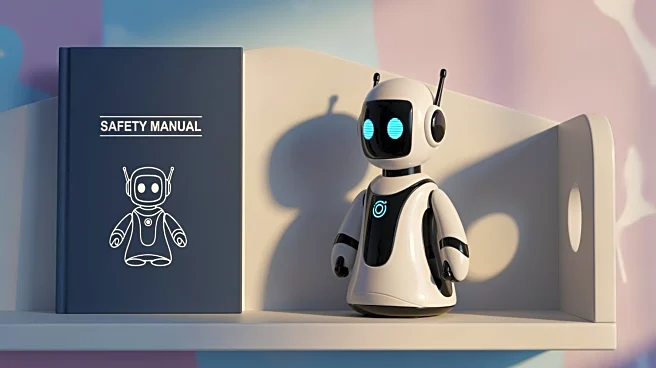What's Happening?
Children's and consumer advocacy groups are urging parents to avoid purchasing artificial intelligence (AI) toys for their children during the holiday season. These toys, marketed to children as young
as two years old, are powered by AI models that have been associated with harmful effects on children and teenagers. The advocacy group Fairplay, along with over 150 organizations and experts, has highlighted issues such as fostering obsessive use, explicit sexual conversations, and encouraging unsafe behaviors. AI toys, often marketed as educational, are said to displace important creative and learning activities, disrupting children's relationships and resilience. Despite some AI toys being sold online and more popular in Asia, they are beginning to appear on U.S. store shelves. Concerns have been raised about the lack of regulation and research surrounding these products, with some manufacturers, including Mattel, potentially releasing more AI toys.
Why It's Important?
The warnings from advocacy groups underscore the potential risks AI toys pose to children's development and safety. As AI toys become more prevalent, they could significantly impact how children interact with technology and each other. The lack of regulation and research on these toys raises concerns about their safety and the long-term effects on children's cognitive and social development. Parents and caregivers are encouraged to consider the implications of AI toys replacing traditional play, which fosters creativity, language, and problem-solving skills. The advocacy groups suggest that analog toys, which require children to invent stories and work through problems, are a better option for supporting healthy development.
What's Next?
As AI toys continue to enter the market, there may be increased scrutiny and calls for regulation to ensure their safety for children. Manufacturers might face pressure to implement stricter safety measures and parental controls. Advocacy groups are likely to continue monitoring the impact of AI toys and push for more research into their effects on child development. Parents and caregivers may become more cautious about purchasing AI toys, opting for traditional toys that encourage imaginative play and human interaction.
Beyond the Headlines
The rise of AI toys highlights broader ethical and cultural questions about the role of technology in childhood development. As AI becomes more integrated into everyday life, society must consider how these technologies affect children's understanding of relationships and trust. The potential for AI toys to replace human interaction raises concerns about the erosion of essential social skills and the ability to form meaningful connections. This development may prompt discussions about the balance between technological advancement and preserving traditional forms of play and learning.










